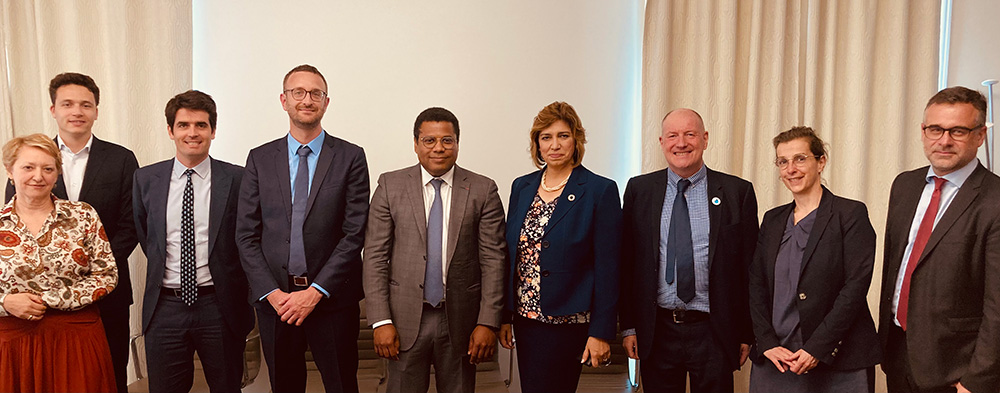UNCDF: Growth Capital Plan to Assist the World’s Least-Developed Nations
The International Municipal Investment Fund and allied initiatives will support entities with the potential to make a real difference in frontier markets.

UNCDF Executive Secretary Preeti Sinha and UN-Habitat Executive Director Maimuhan Mohd Sharif
The International Municipal Investment Fund (IMIF)
UNCDF and Meridiam signed an agreement to collaborate on the International Municipal Investment Fund (IMIF). The investment vehicle — the non-OECD sleeve of The Urban Resilience Fund — has a focus on developing countries, and was launched by Meridiam and the Rockefeller Foundation. It will help to develop, finance, build and operate sustainable and economically sound infrastructure projects that have a critical role to play in adapting and mitigating urban climate change.
The IMIF leverages concessional and commercial capital to increase the financing capacity available for urban infrastructure. It provides cities with support for the development and delivery of urban resilience infrastructure.
“This agreement is a further step towards our global ambition to meet the critical need for urban infrastructure that is sustainable, affordable and prepared for long term climate change while contributing to the resilience of cities,” said Meridiam founder and CEO Thierry Deau.
Preeti Sinha, Executive Secretary of UNCDF, said the IMIF would provide access to impact capital for cities and local governments “at scale for the frontier markets of today and the growth markets of tomorrow”.
As an independent Benefit Corporation under French law, Meridiam will act as investment manager for the fund. It has the objective of identifying, developing, and investing in resilient and sustainable infrastructure projects by investing in equity and quasi-equity securities.
UNCDF — the UN’s flagship catalytic finance entity for the world’s 46 least developed countries — will provide projects with early-stage pipeline development. With its coalition partner, United Cities and Local Governments (UCLG) — a global network of some 1,000 cities in 140 countries — UNCDF will provide access to a network of local experts working with municipalities.
The fund will be leveraged as a tool of the Malaga Coalition, which was launched in 2019 by UNCDF, UCLG and its technical partner, the global Fund for Cities Development (FMDV). The coalition’s goal is to lead in the advocacy, creation, and support of a global financial ecosystem for cities and local governments. The fund hopes to accelerate Agenda 2030 by increasing investment in SDG-orientated projects at the local level.
Accompanying the IMIF is an “Expression of Interest” for The International Municipal Investment Fund, Technical Assistance Facility (IMIF TAF), which is managed by UNCDF.
The IMIF Technical Assistance Facility will provide support to assist with cities and local government projects. Furthermore, IMIF TAF will support policy and regulatory reform. IMIF TAF focuses largely on providing direct support to municipalities in developing countries.
After completing the Technical Assistance phase, projects that the IMIF TAF will support may be eligible for acceptance by IMIF for investment.

Reps of UNCDF and Meridiam, including Preeti Sinha and to her right, Thierry Deau, Meridiam Chairman and CEO.
The Cities Investment Facility
The UN’s Human Settlements Programme (UN-Habitat) and the UNCDF have announced the launch of the Cities Investment Facility (CIF) as part of the partnership.
The CIF is designed to support investment in small and intermediary cities, and develop and deploy innovative financial models. It will play a crucial role in advancing sustainable finance at the local/subnational level, where most sustainable development services are delivered.
UNCDF and UN-Habitat aim to raise $40m over the next four years to support the required programming, operations, and technical support. The goal is to assist 250 cities with sustainable finance support by 2025.
“The partnership between UN-Habitat and UNCDF will look to leverage each organisation’s distinct strengths to support sustainable finance at the local level,” said Sinha.
UN-Habitat executive director Maimunah Mohd Sharif added: “Through this offering, cities in emerging and developing economies will be supported to build effective, own-source revenues and public financial management systems to prepare high-impact projects that can be financed, and reach local and international investors to deliver the SDGs’ impact.”
The partnership between UN-Habitat and UNCDF will look to leverage each organization’s distinct strengths in order to support sustainable finance at the local level. UN-Habitat’s experience of promoting and consolidating collaboration with local governments to implement the Sustainable Development Goals (SDGs) will be coupled with UNCDF’s expertise in local transformative finance as the UN hub for subnational finance.
Call to Action
There is a frequent call for the private sector to become an active and robust agent for sustainable development. The question is perhaps not why we should do this, but how can we do it. What financing models can catalyse private capital towards SDG-positive projects with commercial potential?
These two funds are intended to address that question.
If the private sector is continually asked to increase its appetite for promising projects in often overlooked or riskier markets, then the actors outside of the private sector need to increase its appetite for risk and innovation. Even without the agility of the private sector, the openness to new instruments, new capabilities, and a greater willingness to play a role as a de-risking partner for the private sector, make it possible.
The IMIF and the Cities Investment Facility embrace the risk and innovation needed to unlock private finance to ensure that capital serves humanity — and not the other way around.
You may have an interest in also reading…
MIGA (World Bank): During the Storm – Shift from North to South FDI
By Manabu Nose and Moritz Zander[1] At MIGA (the Multilateral Investment Guarantee Agency) we see the principal near-term risks for
France: Touch and Go
So far this year, Europe’s centre ground has held firm – sort of. After Dutch populist Geert Wilders in March
The Red Sea International Airport Takes Off: Contract Award to Nesma & Partners and Almabani
This contract has been awarded to support the creation of a sustainable gateway opening Saudi Arabia to the world Riyadh,


















































































